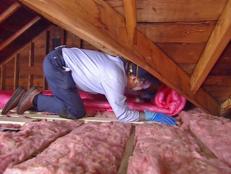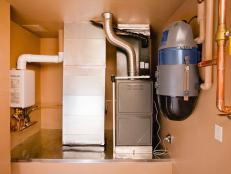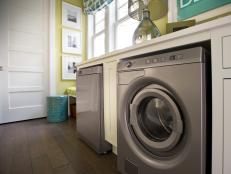Home Energy Audits and Surveys
Most existing homes could stand to undergo some level of energy efficiency upgrade — in fact, many of us live in leaky barns and are simply unaware of the energy we are wasting. However, each home is vastly different from the next, so it's difficult to tell on the surface what you can do to improve energy performance. No matter if you're undertaking a weatherization project (self funded or paid for by the Weatherization Assistance Program), an energy efficient remodel or a deep-energy retrofit, a solid home energy survey or a professional audit is a critical starting point. A home energy audit is a thorough, professional inspection and analysis of the energy performance of your home. A survey is a "lighter" version of an audit.
Surveys and audits come from two primary sources — utility companies and independent auditors. Surveys involve less verification of actual data — meaning little or no diagnostic testing (such as blower door or duct blaster tests). A comprehensive home energy audit collects and analyzes more data and provides detailed recommendations for home energy improvement.
If you're undertaking a self-funded weatherization or energy efficient remodel, start with your utility program to determine if they offer free or discounted surveys. Many do, regardless of income level, as long as the home hasn't been audited in the past. If you're part of the WAP, the survey will be part of the weatherization service provided. If you're undertaking a deep-energy retrofit, skip the freebies and hire a professional, certified auditor to get you started on the right path.
Utility Company Survey
A utility survey is great place to start and may be all you need. A utility company survey is performed by a third-party contractor. This survey often involves a visual inspection of the home, simple measurements and calculations, and an evaluation of your energy usage (bills). The company will create a report that details your home's energy use and provides recommendations for improvements. Often, the utility company will provide simple materials and products (i.e., compact florescent bulbs, weather stripping and/or faucet aerators) as part of this service. For lucky customers, utility companies may offer comprehensive home energy audits free of charge.
Comprehensive Home Energy Rating/Audit
Because the goal of utility-based programs is often to provide a simple level of home energy improvement, a home energy audit and rating provided by a qualified, third-party professional is a good bet for anyone interested in going beyond the basics, and a must-have for deep-energy retrofitters. This audit and rating provides a much more comprehensive analysis of home energy use, and a better platform to make decisions about which measures to undertake.
A home energy audit is a scientific analysis of the performance of your entire home — and its subsystems. A home energy rating is a score created by reviewing home energy characteristics, such as wall-to-window ratios, heating and cooling system efficiency, etc. During an audit — and to calculate a rating — diagnostic performance testing is conducted. Data on the home is then entered into computer software that calculates a score — between 0 and 150 — depending on its energy performance. The lower the number, the lower the home's energy use. The higher the number, the more energy the home consumes. A typical existing home scores about 130, a typical new home about 100 and a home that produces as much energy as it uses about 0.
A home energy audit and rating costs on average $500 (ranges in the U.S. are from $165 to $1,000). It's critical to ensure that your home energy auditor is a qualified professional, so check out organizations like the Residential Energy Services Network and the Building Performance Institute to find certified contractors.







































